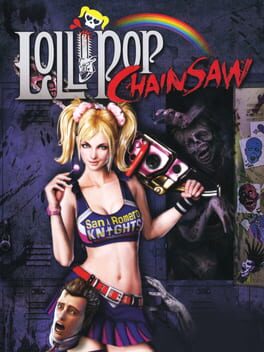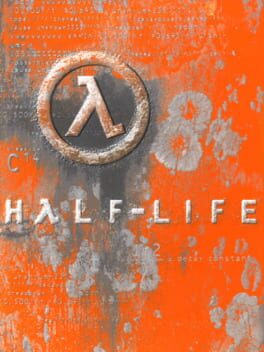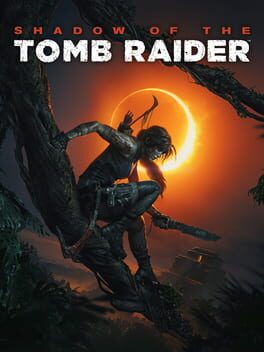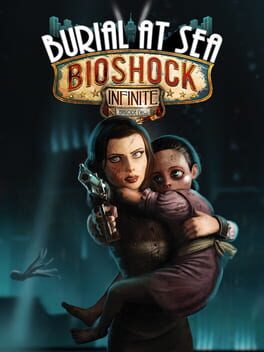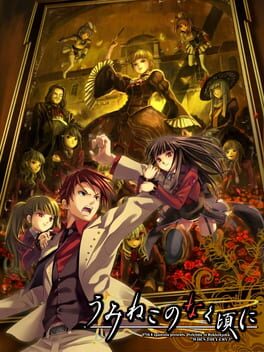limpbizkitlover
71 reviews liked by limpbizkitlover
Lollipop Chainsaw
2012
This game formed my entire personality. I love it so much. No words can describe just how special lollipop chainsaw and Juliet starling are to me. I am so so so excited for the remaster to release. I am praying there will be a collectors edition and a re-release of the Juliet starling figure if possible!!
Half-Life
1998
Kinda astonishing I hadn't played this one until now, but here we are...
Half-Life, to my mind, exists in a bit of an odd spot in the history of the genre. In a way it feels like the missing link between Doom-clone boomer shooters and the more expansive immersion and worldbuilding-focussed games that came afterwards. I enjoyed finally playing this one a fair bit; the organic storytelling and especially the decision to have almost no exposition dumping in this game honestly holds up pretty well to this day. Black Mesa feels like a real, living place (albeit comically oversized and tropey); it definitely could have done with a few additional NPC models / voice lines, but the environmental storytelling is honestly decent even by today's standards.
Where Half-Life doesn't hold up so well is with its gameplay. The core game is its gunplay. The enemy variety is great and there is a nice selection of weapons on offer, most of which feel satisfying to use, but I feel there may be too many weapons here; the UI is not streamlined enough to make it easy to remember where each of your guns is in the toolbar, and switching between them during combat (which is often necessary) is awkward and imprecise as a result. Also, I played this on PC, and the auto-aim is the most egregious I have ever seen. I understand the need for a bit of auto-aim in games like this to improve the player experience, but there is absolutely no subtlety to it here at all. In fact I often found myself having to actively fight against the auto-aim; for example if an enemy was stood next to an explosive barrel, the game would simply refuse to let me shoot the barrel if the enemy was too close because it would latch onto the enemy instead. The auto-aim also seemed to have a bit of a hard time tracking flying enemies, and I'm pretty sure I would have been more accurate at hitting them without it.
There are also some minor platforming elements to the game, and... yeah they suck. It seems obvious to me that this engine is just not appropriate for platforming challenges, and yet Half Life insists on having them anyway. Freeman moves way too fast for some of the precision needed in this game (even when crouching), and a fair few jumps rely on janky features like 'crouch-jumping' which are never explained to the player, make no intuitive sense and feel more like a bug that was reinterpreted as a feature somewhere in development. The platforming comes to a head in the final couple of areas. Don't get me wrong, Xen absolutely looks the part, but all the platforming in this area make me never want to play it again. Thank god for the ability to make save states at will.
The overall feeling I get is a game that doesn't respect its own limitations. Half Life tries to do a lot of things that the state of technology at the time just wasn't quite able to pull off. I guess the attempt to try new things is something to be commended, but I equally have respect for something like Doom which is incredibly aware of its technological limitations and consequently still stands up as a game perfectly well to this day.
Despite all this, I did still enjoy Half Life a fair bit in the end. A lot of this enjoyment comes from ability to experience a piece of gaming history (see also Doom and Super Mario 64), and honestly the game's numerous shortcomings and dated features weren't enough to put too much of a dent in this. This is probably another one of those games that I'll never replay, but I'm glad to have played through it once and would encourage any gamers who haven't to give it a go.
Half-Life, to my mind, exists in a bit of an odd spot in the history of the genre. In a way it feels like the missing link between Doom-clone boomer shooters and the more expansive immersion and worldbuilding-focussed games that came afterwards. I enjoyed finally playing this one a fair bit; the organic storytelling and especially the decision to have almost no exposition dumping in this game honestly holds up pretty well to this day. Black Mesa feels like a real, living place (albeit comically oversized and tropey); it definitely could have done with a few additional NPC models / voice lines, but the environmental storytelling is honestly decent even by today's standards.
Where Half-Life doesn't hold up so well is with its gameplay. The core game is its gunplay. The enemy variety is great and there is a nice selection of weapons on offer, most of which feel satisfying to use, but I feel there may be too many weapons here; the UI is not streamlined enough to make it easy to remember where each of your guns is in the toolbar, and switching between them during combat (which is often necessary) is awkward and imprecise as a result. Also, I played this on PC, and the auto-aim is the most egregious I have ever seen. I understand the need for a bit of auto-aim in games like this to improve the player experience, but there is absolutely no subtlety to it here at all. In fact I often found myself having to actively fight against the auto-aim; for example if an enemy was stood next to an explosive barrel, the game would simply refuse to let me shoot the barrel if the enemy was too close because it would latch onto the enemy instead. The auto-aim also seemed to have a bit of a hard time tracking flying enemies, and I'm pretty sure I would have been more accurate at hitting them without it.
There are also some minor platforming elements to the game, and... yeah they suck. It seems obvious to me that this engine is just not appropriate for platforming challenges, and yet Half Life insists on having them anyway. Freeman moves way too fast for some of the precision needed in this game (even when crouching), and a fair few jumps rely on janky features like 'crouch-jumping' which are never explained to the player, make no intuitive sense and feel more like a bug that was reinterpreted as a feature somewhere in development. The platforming comes to a head in the final couple of areas. Don't get me wrong, Xen absolutely looks the part, but all the platforming in this area make me never want to play it again. Thank god for the ability to make save states at will.
The overall feeling I get is a game that doesn't respect its own limitations. Half Life tries to do a lot of things that the state of technology at the time just wasn't quite able to pull off. I guess the attempt to try new things is something to be commended, but I equally have respect for something like Doom which is incredibly aware of its technological limitations and consequently still stands up as a game perfectly well to this day.
Despite all this, I did still enjoy Half Life a fair bit in the end. A lot of this enjoyment comes from ability to experience a piece of gaming history (see also Doom and Super Mario 64), and honestly the game's numerous shortcomings and dated features weren't enough to put too much of a dent in this. This is probably another one of those games that I'll never replay, but I'm glad to have played through it once and would encourage any gamers who haven't to give it a go.
Half-Life
1998
Spec Ops: The Line
2012
Saya no Uta
2003
This is probably the best one in the trilogy, I wonder why it didn't get the attention when it first came out. It's not a perfect game but it is fun to play.
Overall, the game lacks combat sequences. There's not enough combat in the game. All the upgrades, skill trees, and looting feel unnecessary 80% of the time. Especially (I guess) I got some DLCs, and I had some equipment that was almost fully upgraded. So I never used the loot I gathered to upgrade my loot. Also, combat mechanics are not even fun.
The gameplay heavily consists of exploration and puzzles. And the main reason I'm satisfied with the game is that these parts feel great. Puzzles, tombs, and crypts are fun to explore.
I'm not even gonna talk about the story or the side missions. It's the weakest part of the game for me.
Overall, the game lacks combat sequences. There's not enough combat in the game. All the upgrades, skill trees, and looting feel unnecessary 80% of the time. Especially (I guess) I got some DLCs, and I had some equipment that was almost fully upgraded. So I never used the loot I gathered to upgrade my loot. Also, combat mechanics are not even fun.
The gameplay heavily consists of exploration and puzzles. And the main reason I'm satisfied with the game is that these parts feel great. Puzzles, tombs, and crypts are fun to explore.
I'm not even gonna talk about the story or the side missions. It's the weakest part of the game for me.
BioShock Infinite
2013
Fallout: New Vegas
2010
Umineko seems to be a love-it-or-hate-it experience for a lot of people. It was more of a love-it-and-hate-it kind of thing for me. There is just...so much packed into this story, both good and bad! The good is super good, but the bad is also pretty bad. For the sake of my sanity, this is going to be more of a list than a proper review.
Loved:
(1) The premise. Umineko is, from the start, just a really fun genre parfait. You’ve got mystery, horror, and fantasy tropes in there, mixed with nice crunchy bits of gothic family drama, and it’s all drizzled with a metafictional fudge on top. It’s a unique set-up with tons of atmosphere and so much storytelling potential.
(2) The characters. Umineko has a huge cast of memorable characters brought to life by some of the best voice acting I have ever heard. I could listen to Ohara Sayaka cackle all day long. (If you like evil laughter, Umineko occupies at least, like, six out of ten spots in the Top Ten Best Evil Laughs in Video Games.) The character writing in general is extremely good. It’s possible to forget—for hours at a time—that these are silly-looking sprites in a goofy anime game, because they feel so much like real people. Even the most despicable characters remain compelling (Rosaaaa), and all of the relationships, especially the family dynamics, are believable and complex.
(3) The themes. Umineko is thematically ambitious to a fault, but it’s refreshing to see a story just really go for it. There are so many Big Ideas in this game. While I’m doubtful that it succeeds in saying much of anything sensible in the end, I appreciate that it is earnestly trying to say something—often several things at once—and if I had, oh, a few hundred spare hours of free time lying around, I might be tempted to read it a second time to peel back more of the layers.
(4) The artwork. I know I called the sprites “silly-looking” (they are) but Ryukishi’s art really grows on you—the clumsiness is endearing and the facial expressions are wonderful. (I hate the console and pachinko sprites but ymmv.)
(5) The soundtrack. It’s banger after banger p much.
Hated:
(1) The otaku shit. Umineko was written for an audience of hardcore VN fans. Every time I was reminded of this target audience, and how much I do not belong to it, it was like nails on a chalkboard. They aren’t so pervasive as to ruin the experience, but the pandering in-jokes and fanservicey moments really pulled me out of the story. Moreover, the game was released serially for the most dedicated fans to devour chapter by chapter, line by line, going over each scene with a fine-tooth comb for clues. Many of the storytelling choices make less sense removed from this original context. I often felt like the author was being maddeningly opaque for no reason; in fact, he is being opaque on purpose (to give fans more grist for the theory-crafting mill), but unless you have approximately ten zillion hours of free time to set aside for note-taking and puzzle-solving, this habit of never saying anything directly will likely just drive you up the wall.
(2) The mysteries. Umineko is not really about the mysteries—it’s more interested in the abstract concept of Mystery Fiction than in the nitty-gritty details of each murder—but, on the other hand, it’s not really not about the mysteries, since they take up at least a hundred hours of the time you will spend reading this dang thing (and considerably more time than that if you actually try to solve them). It is a shame, then, that the mysteries kinda blow. Ryukishi wants us to believe that the “whodunnit”—it was Colonel Mustard in the library with a candlestick!—is less important than the “whydunnit,” the tortured heart behind the crimes. But the one time that “whydunnit” matters, it is explained in such a convoluted way as to be virtually nonsensical, and actually made me understand the character less than I did before. You also have to wait seven chapters for this motive to be revealed—and that’s it. That’s all you get. The rest of the mysteries are just soulless logic puzzles. The author has so little interest in them by the end that he just sweeps them all aside in a single scene—and frankly I don’t blame him, because the solutions are so underwhelming, I wouldn’t want to draw any attention to them either. A few questions are raised which do have satisfying answers, but they are mostly regarding background details; overall, Umineko is far more successful as a story about mysteries than as a mystery story.
(3) The themes. I know I said I liked the themes, but the thematic ambition of Umineko is also kind of its downfall. Especially in the second half, the more Ryukishi tries to draw all these thematic threads together into a bow, the more they get tangled up in a big perplexing wad of nothing. Part of the problem is a terminal case of trying to have his cake and eat it too. Like, do the mysteries matter, or don’t they? If the pursuit of a single truth is so wrongheaded, why expend so many thousands of words encouraging readers in that pursuit? Why must love and truth, empathy and reality, be diametrically opposed? The last chapter, rather than bringing clarity to these contradictions, retreats into boring cliches, and sometimes plain old falsehoods. It is quite seriously suggested that the only way to overcome trauma, actually, is to run away from reality and escape into a fantastical delusion, because, uhhh, that’s the power of magic, folks?? Ryukishi’s best writing is rooted in his experience as a social worker, and his sharp observations of human behavior, but every once a while he just runs obliviously into the limits of his own perspective with a resounding smack, and it’s a huge bummer that one of his most embarrassing fumbles comes as he is trying to deliver a grand statement. He simply does not understand trauma well enough to say anything meaningful about it, and I’m not convinced that the other themes fare much better in the end.
(4) George Ushiromiya. He sucks.
This is, of course, an extremely distilled and spoiler-redacted version of my thoughts on Umineko; I could probably write a dissertation or two about this game. While I’m on the fence about whether I think it’s good or not, I am glad that I read it, and I can see why it resonates with so many people. I will certainly remember the characters, if nothing else. As for the rest—well, as Ryukishi would probably tell you if your family had been brutally murdered by goat demons, just use the power of magic, and pretend it never happened!
Loved:
(1) The premise. Umineko is, from the start, just a really fun genre parfait. You’ve got mystery, horror, and fantasy tropes in there, mixed with nice crunchy bits of gothic family drama, and it’s all drizzled with a metafictional fudge on top. It’s a unique set-up with tons of atmosphere and so much storytelling potential.
(2) The characters. Umineko has a huge cast of memorable characters brought to life by some of the best voice acting I have ever heard. I could listen to Ohara Sayaka cackle all day long. (If you like evil laughter, Umineko occupies at least, like, six out of ten spots in the Top Ten Best Evil Laughs in Video Games.) The character writing in general is extremely good. It’s possible to forget—for hours at a time—that these are silly-looking sprites in a goofy anime game, because they feel so much like real people. Even the most despicable characters remain compelling (Rosaaaa), and all of the relationships, especially the family dynamics, are believable and complex.
(3) The themes. Umineko is thematically ambitious to a fault, but it’s refreshing to see a story just really go for it. There are so many Big Ideas in this game. While I’m doubtful that it succeeds in saying much of anything sensible in the end, I appreciate that it is earnestly trying to say something—often several things at once—and if I had, oh, a few hundred spare hours of free time lying around, I might be tempted to read it a second time to peel back more of the layers.
(4) The artwork. I know I called the sprites “silly-looking” (they are) but Ryukishi’s art really grows on you—the clumsiness is endearing and the facial expressions are wonderful. (I hate the console and pachinko sprites but ymmv.)
(5) The soundtrack. It’s banger after banger p much.
Hated:
(1) The otaku shit. Umineko was written for an audience of hardcore VN fans. Every time I was reminded of this target audience, and how much I do not belong to it, it was like nails on a chalkboard. They aren’t so pervasive as to ruin the experience, but the pandering in-jokes and fanservicey moments really pulled me out of the story. Moreover, the game was released serially for the most dedicated fans to devour chapter by chapter, line by line, going over each scene with a fine-tooth comb for clues. Many of the storytelling choices make less sense removed from this original context. I often felt like the author was being maddeningly opaque for no reason; in fact, he is being opaque on purpose (to give fans more grist for the theory-crafting mill), but unless you have approximately ten zillion hours of free time to set aside for note-taking and puzzle-solving, this habit of never saying anything directly will likely just drive you up the wall.
(2) The mysteries. Umineko is not really about the mysteries—it’s more interested in the abstract concept of Mystery Fiction than in the nitty-gritty details of each murder—but, on the other hand, it’s not really not about the mysteries, since they take up at least a hundred hours of the time you will spend reading this dang thing (and considerably more time than that if you actually try to solve them). It is a shame, then, that the mysteries kinda blow. Ryukishi wants us to believe that the “whodunnit”—it was Colonel Mustard in the library with a candlestick!—is less important than the “whydunnit,” the tortured heart behind the crimes. But the one time that “whydunnit” matters, it is explained in such a convoluted way as to be virtually nonsensical, and actually made me understand the character less than I did before. You also have to wait seven chapters for this motive to be revealed—and that’s it. That’s all you get. The rest of the mysteries are just soulless logic puzzles. The author has so little interest in them by the end that he just sweeps them all aside in a single scene—and frankly I don’t blame him, because the solutions are so underwhelming, I wouldn’t want to draw any attention to them either. A few questions are raised which do have satisfying answers, but they are mostly regarding background details; overall, Umineko is far more successful as a story about mysteries than as a mystery story.
(3) The themes. I know I said I liked the themes, but the thematic ambition of Umineko is also kind of its downfall. Especially in the second half, the more Ryukishi tries to draw all these thematic threads together into a bow, the more they get tangled up in a big perplexing wad of nothing. Part of the problem is a terminal case of trying to have his cake and eat it too. Like, do the mysteries matter, or don’t they? If the pursuit of a single truth is so wrongheaded, why expend so many thousands of words encouraging readers in that pursuit? Why must love and truth, empathy and reality, be diametrically opposed? The last chapter, rather than bringing clarity to these contradictions, retreats into boring cliches, and sometimes plain old falsehoods. It is quite seriously suggested that the only way to overcome trauma, actually, is to run away from reality and escape into a fantastical delusion, because, uhhh, that’s the power of magic, folks?? Ryukishi’s best writing is rooted in his experience as a social worker, and his sharp observations of human behavior, but every once a while he just runs obliviously into the limits of his own perspective with a resounding smack, and it’s a huge bummer that one of his most embarrassing fumbles comes as he is trying to deliver a grand statement. He simply does not understand trauma well enough to say anything meaningful about it, and I’m not convinced that the other themes fare much better in the end.
(4) George Ushiromiya. He sucks.
This is, of course, an extremely distilled and spoiler-redacted version of my thoughts on Umineko; I could probably write a dissertation or two about this game. While I’m on the fence about whether I think it’s good or not, I am glad that I read it, and I can see why it resonates with so many people. I will certainly remember the characters, if nothing else. As for the rest—well, as Ryukishi would probably tell you if your family had been brutally murdered by goat demons, just use the power of magic, and pretend it never happened!
